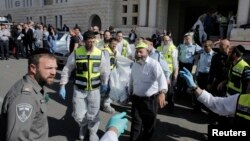President Barack Obama has condemned Tuesday’s attack on a Jerusalem synagogue that killed five people, including three U.S. citizens, as a tragedy for both Israel and the United States. While Obama urged Israelis and Palestinians to lower tensions and reject violence, one regional analyst suggests this latest incident only serves to underscore the failure of the peace process.
President Obama said the two Palestinian attackers “senselessly and brutally” attacked innocent worshippers as they prayed in the Har Nof neighborhood of west Jerusalem and condemned the attack “in the strongest terms.”
"Tragically, this is not the first loss of life that we have seen in recent months. Too many Israelis have died. Too many Palestinians have died. And, at this difficult time, I think it’s important for both Palestinians and Israelis to try to work together to lower tensions and to reject violence," said Obama.
The president said such outrageous acts represent the kind of extremism that threatens to bring all of the Middle East into a kind of spiral from which it is very difficult to emerge.
U.S. Secretary of State John Kerry, speaking in London Tuesday, condemned what he called “an act of pure terror.” He spoke by phone with Israeli Prime Minister Benjamin Netanyahu and Palestinian President Mahmoud Abbas, who also condemned the attack.
Kerry called on the Palestinian leadership to take “serious steps to restrain any kind of incitement… and exhibit the kind of leadership that is necessary to put this region on a different path.” U.S.-brokered peace talks collapsed in April.
U.N. Secretary-General Ban Ki-moon denounced Tuesday’s “reprehensible incident” and warned that the “steadily worsening situation on the ground only reinforces the imperative for leaders on both sides to make the difficult decisions that will promote stability and ensure long-term security for both Israelis and Palestinians.”
Four victims of the attack were Israelis with dual nationality, three of whom were Americans. The fourth was from Britain. They were all rabbis. The fifth victim was an Israeli policeman.
Jonathan Bein, brother-in-law of one of the victims, 55-year old Rabbi Kalman Levine, said Levine was deeply committed to Israel.
"Perhaps the saving grace was that, because of his commitment to the land of Israel, commitment to being in Jerusalem that he went the way he would have wanted to go, which is in prayer in the land of Israel, in Jerusalem," said Bein.
At the Hyman Brand Hebrew Academy in Kansas City, Missouri, Rabbi Daniel Roccoff paid tribute to two of three Americans, Levine and 59-year old Rabbi Mosheh Twersky, both of whom had close ties to the school.
"Both men personified Jewish ideals and values and were deeply committed to their families. They will be deeply missed by their spouses, children and grandchildren, and by the global Jewish community," said Roccoff.
The third American was identified as 43-year old Rabbi Aryeh Kupinsky.
In London, a cousin of Rabbi Avraham Goldberg, Michelle Hirschfield, described the 68-year old as “very tolerant” and “non-judgmental.”
"He was a religious Jew. He was not a fanatical religious Jew. But, he felt that this was the place that he would like to bring up his family, that he had always been brought up as a Zionist, and that he felt that this was the place where a Jew should live," said Hirschfield.
Tuesday’s attack is the latest in a series of incidents that have raised tensions in Jerusalem and the West Bank. Regional analyst and history professor Michael Fischbach of Virginia’s Raldolph-Macon College said it underscores the perception, especially among many Palestinians, that the peace process is dead.
"The Palestinian Authority itself is seen as failed. The PLO (Palestine Liberation Organization), which is technically what is involved in the [peace] negotiations with Israel, not the Palestinian Authority, although they are in many ways identical, has failed. Hamas and its sense of offering an alternative… of course, we saw in the Gaza war this summer that that alternative leads to more violence. I think ordinary Palestinians feel that the [Israeli] occupation has continued, the situation in Jerusalem has continued to worsen and, in a sense, all bets are off. For Israelis, we can see rather the same thing, but differently focused. From their point of view, [the question is,] ‘Is there a partner for peace, is there any hope?" said Fischbach.
He said this is a result of the failure of the 1993 Oslo peace process, which was signed by both Israelis and Palestinians and aimed at ending decades of hostilities.
Fischbach fears the threatened tough Israeli response to Tuesday’s attack will not only provoke further attacks, but create problems with the Jewish state’s traditional allies, such as the United States.




